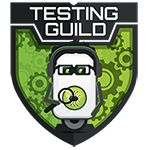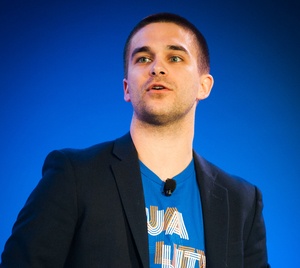
2018 LINEUP (* speakers time subject to change) |
|---|
DAY 1 June 20 (all time are in EDT) 9-9:45 AM(EDT) Joe Colantonio (Host) - Pre-show warm up to make sure everything is working before conferences starts.  9:45-10:0 AM(EDT) Joe Colantonio (Host) - Introduction 10-10:50 AM(EDT) Stephen Vance (Mabl) - Integration of Dev and Test roles in Agile Teams Agile approaches try to change the way teams work, blending traditional roles into a single “development team.” All too often, they simply compress the old ways of doing things into two-week boxes. This misses the point, exacerbates old tensions, and fails to deliver the expected benefits. In this talk, Stephen will give concrete, actionable steps you can take to work through these challenges and achieve greater happiness, collaboration, and results. 11-11:50 AM(EDT) Maaret Pyhäjärvi - Intersection of Automation and Exploratory Testing In this talk, Maaret will share how you can use skills-focused path to better testing in the intersection of automation and exploratory testing. You can arrive at the intersection by enhancing your individual skills, or your collaboration skills. What could you do to become one of those testers who companies seek after that work well in the intersection, giving up the false dichotomy? Takeaways:- recognizing skill in testing and skill in programming for testing as dimensions- building skills in testing / programming- using collaboration to achieve better testing 12:30-1:20 PM(EDT) Bhavani R - Test Management Evolution Bhavani will explain about how the test management evolved from spreadsheets to test management tool and then into AI. After that will give a screen share session of prediction of test coverage of project with the machine learning library Weka. 1:30-2:20 PM(EDT) Jean Ann Harrison - Systems Thinking Approach to Mobile Test Development Go beyond testing your mobile applications from a functional or GUI focus to approach your mobile testing from a systems perspective. This session will take attendees on a journey of system thinking to incorporate larger test coverage while exposing areas needing to have stronger design. The focus will be applying this approach for developing tests specifically for mobile application development. Attendees will join Jean Ann in creating a mind map in how to test the LinkedIn app to help generate test conditions to include boundary tests, stressing those boundaries, testing the performance to include timing and load. The mind map will also help the tester to explore the path coverage and decision making of the application. As we build this mind map, attendees are encouraged to continue to add to the mind map as practice to strengthen their systems thinking approach. 2:30-3:20 PM(EDT) Rodrigo Cursino - Using Testing Marathons to Support a Culture of Quality Achieve high levels of quality for a product, deliver valuable software, keep the customer satisfied, stimulate the motivation and happiness of the teams and have their members always improving their technical skills are constant challenges on a project or company. In order to deal with these questions, the teams have to be creative and apply innovative approaches on their day-to-day tasks. Testing Dojos, Hackathons and Mob Testing are examples of these strategies. 3:30-4:20 PM(EDT) T.J. Maher - How to Work With Developers T.J. Maher has been a software tester for over twenty years since before the concept of Agile software development existed. He believes the relationship between developers and testers should not be one of artist and art critic. Instead, it should be one of a writer and a copyeditor, each working together to create a quality product. T.J. will be sharing his experiences working with developers pre-Agile, working with them on Agile teams, and his insight gained by shifting to automation development. End of Day Roundtable Topic - Test Leadership DAY 2 June 21 9-9:45 AM(EDT) Joe Colantonio (Host) - Pre-show warm up to make sure everything is working before conferences starts.  9:45-10:0 AM(EDT) Joe Colantonio (Host) - Introduction 10-10:50 AM(EDT) Ryan Yackel (QASymphony) - Making the Move to Behavior Driven Development (BDD) Properly implemented Behavior Driven Development (BDD) helps to drive increased automation, achieve quicker development cycles, facilitate better collaboration between departments, and reduce siloed communication. Additionally, BDD is an ideal counterpart to continuous integration/delivery by solving testing bottlenecks. Despite the benefit, BDD is under-adopted. Studies find that between 10% and 25% of development organizations have implemented or are experimenting with a BDD process. Ryan will discuss how BDD moves testing up front to avoid rushed end-of-cycle testing and how automation is included from the start to achieve automation coverage. Ryan will get practical with a real-world working example showing a BDD example in a continuous integration workflow using Jira, Github, Jenkins, and Cucumber. Ryan will also share a successful framework for evaluating your readiness for BDD, considering any potential roadblocks, and making a seamless transition.  Gáspár Nagy - Creator of SpecFlow & Author of the book “BDD Books: Discovery – Explore behavior using Examples Ryan Yackel can't make the LIVE Q&A so Gaspar will be answering any question you might have on BDD. 11-11:50 AM(EDT) Ali Khalid - The Recall, Becoming Technical and Averting Disaster A story of how a testing team took responsibility for quality of a new game changer product, learned more about the product’s architecture and worked towards becoming more technical. It illustrates the importance and how to implement white box testing, features of the application testers should focus more attention on and how to create business value.  12:30-1:20 PM(EDT) Jason Arbon - Testers Don't Test Anymore Jason was chatting with some other test nerd friends recently, and he bought up the idea that "Testers Don't Test Anymore" (alt title "Rise of the Software Verifier"). It stirred a lot of discussion and resulted in mostly surprised agreement. Jason is old enough to have seen the transition from testing to verification, and want to get more discussion around this idea and what to do about it in the field of testing. 1:30-2:20 PM(EDT) Greg Paskal - An introduction to METS, the Minimal Essential Testing Strategy Is your QA Team scrambling to determine what to test when development timeframes get compressed? Are they endlessly creating mountains of test cases that rarely get used a second time? Are you challenged to know what needs testing when QA Team Members are out of the office but testing still needs to happen? 2:30-3:20 PM(EDT) Brendan Connolly - Test Driven Testing Think Test Driven Development only applies to developers? We'll dive into how the 3 laws of TDD can applied to testing to provide testers with the same tight feedback loop and positive outcomes that TDD provides, while increasing acceptance and understanding across roles. Session Takeaways: 3:30-4:20 PM(EDT) Amber Race - First Class API Exploratory Testing with Postman Exploratory testing isn't just for your UI - with tools like Postman, you can fully explore your service level APIs as well. In this session, Amber will walk you through a basic api testing strategy while walking you through how to execute that strategy with Postman. Even those familiar with Postman may pick up a new trick or two! 4:30-5:10 PM(EDT) Andy Tinkham (Roundtable Expert) 4:30-5:10 PM(EDT) Melissa Tondi (Roundtable Expert)  4:30-5:10 PM(EDT) Mike Lyles (Roundtable Expert) DAY 3 June 22 9-9:45 AM(EDT) Joe Colantonio (Host) - Pre-show warm up to make sure everything is working before conferences starts.  9:45-10:0 AM(EDT) Joe Colantonio (Host) - Introduction 10-10:50 AM(EDT) Andy Dobbels (Mailosaur) - End-to-end testing with Webdriver, Selenium and Mailosaur In this session we will be discussing what end to end testing is and how you can create a suite of end to end tests. We will be using Webdriver.io to run Selenium based tests and Mailosaur to automate email testing. 11-11:50 AM(EDT) Justin Ison - Automated Exploratory Testing In todays Agile world the time to market is becoming increasingly shorter. There is a constant desire to release new features to keep ahead of competition. Because of this we have a shorter amount of time to do exploratory and manual testing. Especially, when you have to account for all the different combinations of OS’s, languages, orientations, and resolutions your mobile app supports.
12:30-1:20 PM(EDT) Chad Capson - How to Pick and Implement A TestCase Management System You came into work, someone broke the test case spreadsheet, management wants another test report, the new hire started today, and another round of regression starts in 30 minutes. Well, we can't solve all of this in one speaking session, but there is something we can solve: making test case management and reporting in your life easier.  1:30-2:20 PM(EDT) Swasti Sharma - Importance of Feature Flags in Agile World How you can leverage A/B testing framework for releasing code with high quality when the time for testing is not enough? Swasti will demonstrate how to know when you software is ready to release. 2:30-3:20 PM(EDT) Parveen Khan - A Tester’s Survival Guide for Agile Transition Agile transformation is challenging, especially for testers who are accustomed to working in a silo. As a lone tester on a team, it’s difficult to find the time to learn new methodologies and adapt to be able to incorporate them as part of your process. While it’s apparent that an agile approach can bring forth several benefits such as the faster delivery of new features, it’s not always obvious what a tester should do to be a part of this change. Our Awesome SponsorsPlatinum Gold Silver |
Copyright text 2018 by TestTalks . GuildConferences is a Joe Colantonio Production | Privacy Policy


























